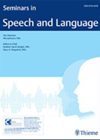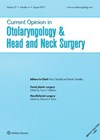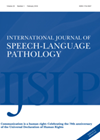
Journal Reviews
Evidence-based clinical education
All healthcare professionals participate in education of students in both their own and other disciplines. It is part of our role and we are often used to squeezing it in and around our clinical responsibilities. In fact, the events during...
Speculating on saliva during endoscopy
It has been noted that the presence of saliva in the pharynx and larynx during flexible endoscopic evaluation of swallowing (FEES) can be an indicator of increased risk of aspiration and consequent pneumonia, as well as weight loss and malnutrition....
Future practice: tele-rehabilitation in speech and language therapy
It is known that our population is ageing, resulting in an increase in the number of people living with progressive neurological conditions such as Parkinson’s disease. Health services endeavour to deliver specialist and personalised care to all these people, often...
People with language-led dementia in India
Primary Progressive Aphasia (PPA) is a language led dementia characterised by slowly worsening speech and language. It is associated with atrophy of the dominant temporal-parietal lobe regions and is commonly caused by frontotemporal or Alzheimer’s pathologies. There are three PPA...
Speedy speedy: people with MND chew faster but speak slower
Motor Neurone Disease (MND) is a progressive neurological condition that affects motor neurons in the brain, brainstem and spinal cord, affecting the control of skeletal muscles for speech, chewing and swallowing. There are two variants of MND, with symptoms typically...
Enhanced recovery following surgery for head and neck cancer – the current evidence
Enhanced recovery after surgery (ERAS) programmes are now well established in many surgical specialities as a means of reducing postoperative complications and length of stay in hospital. Whilst many head and neck teams have interventions used to aid postoperative recovery,...
Remembering how to speak
Reminiscence therapy (RT) is an approach that provides people with dementia opportunities to recount nostalgic memories and access thoughts for communication. It is one of the most commonly used therapies in aged care settings. The aim of RT is to...
Mental practice could be a great COVID-19 solution for delivering swallow rehab
Motor imagery is defined as the process of voluntarily generating a mental image of a motor function without actually doing said function. Mental practice (MP) is the process of doing this repeatedly; practising it. There is some evidence that this...
What do SLTs do in palliative care?
The authors of this article highlight that the number of older people has increased significantly in the last two decades, and the number of people over 85 has doubled in Australia since 1996. They attribute this to improved lifestyle factors...
Planning for the long term when working with young people with TBI
Traumatic brain injuries are most common amongst young people and can have long term consequences. The authors of this article provide an approach to management of cognitive and communication difficulties which starts with a detailed assessment using the model of...
What the people want and need: emerging service for communication needs in Ghana
There is a significant shortfall in rehabilitation service for people with communication difficulties across Majority World countries. It is known that many people in these countries are likely to seek help from a variety of sectors including western healthcare, religious...
Doing it for the men: diversifying the speech and language therapy profession
It is known that many health professions are dominated by females, particularly the allied health professions, such as speech and language therapy. This is more pronounced in the US than in the UK, Australia and other countries. The authors of...









